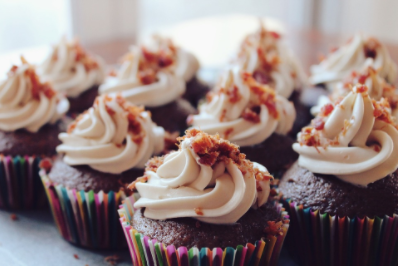By R. Brady
Bake sales. The sugary aroma of cookies, the shouts of people bargaining, and images of large clumps of students in the hallway all come to mind at the phrase. Colorfully decorated cupcakes, cream-filled donuts, and triple-chocolate brownies cover the tables. Bake sales have become a common fundraiser for schools to raise a little extra money to fund activities, sports, etc. Despite the aura of happiness and delight, a few negatives can also be found in this setting.
Kids are constantly surrounded by unhealthy food. Fast food restaurants, candy stores, ice cream shops, and advertisements are just a few offenders. Even the checkout aisle at any store will have surpluses of candy and soda. According to KidsHealth, an organization that informs parents, kids, and teens about health and behavior, one in every three kids in the United States is obese (“Overweight and Obesity”). A bake sale is another opportunity to promote unhealthy habits in school.
Bake sales have many positive aspects as well. For example, our school raised nearly three thousand dollars for charity through a week-long bake sale. Bakes sales also encourage grade unity, as students work together to sell their food. Because of these benefits, I feel as though the negative consequences could be avoided without having to abolish bake sales. One solution is to promote healthy eating in schools. This includes introducing healthy routines, such as a balanced diet and regular exercise. Schools could also try to balance out student’s diets by providing more fruits and vegetables in the school lunches. This way, students can eat healthy lunches, and then feel good about purchasing a sweet treat at the school bake sale.
It’s obvious that sugar sweets sell much better than fruits and vegetables. Though they may bring negative consequences, bake sales are school traditions that encourage unity between students. However, bake sales can still occur if healthy lifestyles are encouraged.
 Tempus Magazine By Students, For Students
Tempus Magazine By Students, For Students 



